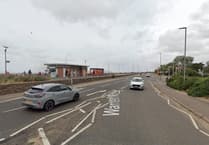Mr Richards already has permission to demolish outbuildings at the Queens Head Inn, Holloway Street, and build three flats in the adjoining Market House Lane.
But planning inspector Oliver Marigold has now ruled that one of the proposed extra flats would not provide satisfactory living conditions for occupants because of the lack of outlook and daylight and would be contrary to the council’s development plan.
In a report, Mr Marigold said that in refusing the application the district council claimed that the proposed flats would affect the privacy of occupants of a nearby development on the site of the former Julian’s Laundry and would also have an effect on the character and appearance of the town’s conservation area.
Council planners had also claimed that the proposed flats would not provide enough living space but Mr Marigold said that he had not seen evidence to back this claim.
On the other hand, the bedroom of flat four of the development would only have roof lights. “Although adequate for the rest of the proposal, the limited number and type of windows serving flat four would result in a poor living environment in terms of daylight and outlook for its occupiers.
“I have also considered whether the proposal’s upper floor windows would harm the privacy of future occupiers of the residential development at Julian’s Laundry. However, I am satisfied that the sloping form of the rooflights would significantly restrict the views available from Flat Four into the adjacent development, preventing any harmful loss of privacy.”
Mr Marigold added: “The site is within the Wellington Square conservation area. Part of the area’s significance is its tight, closely built-up appearance, reflecting the development of the commercial character of the surrounding town centre.
“When viewed from the road, the proposed front elevation would be very similar to the previous approval and reflects the area’s urban nature.
“I am satisfied that the scale, mass and bulk of the proposal would not appear out of place or harmful to the character and appearance of the area.”
Mr Marigold said that the proposed development would make a modest contribution to the supply of housing in the area, on a site within the town centre and close to a range of services and facilities.
There would also be modest economic benefits resulting from both the construction phase and from future occupiers contributing to the local economy. Some limited ecological enhancement is also proposed.
“However, although the proposal would contribute five additional dwellings to the council’s housing supply, the site already has planning permission for three dwellings. The net increase is therefore for two additional dwellings, and as such the benefits of the proposal would be reduced.
“Weighed against these modest benefits is the harm that I have identified to future occupiers of flat four in respect of living conditions. I therefore consider that, in this case, the adverse impacts of granting permission would significantly outweigh the benefits.
Mr Marigold added: “Although I have found that there would be no harm to the character and appearance of the area and no undue pressure on on-street parking, there would be harm to the living conditions of future occupiers.
“I therefore conclude that the appeal should be dismissed.”





Comments
This article has no comments yet. Be the first to leave a comment.